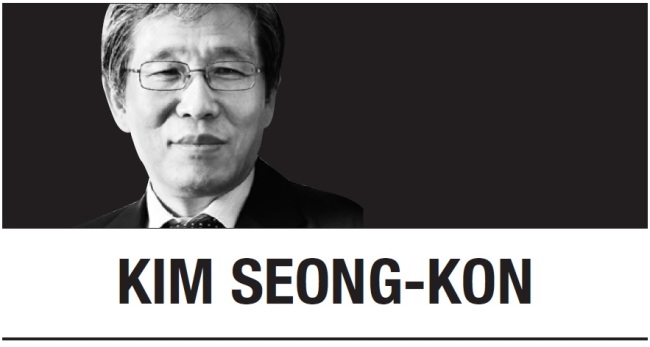[Kim Seong-kon] The fear index based on Korea’s future
By Kim Seong-konPublished : Dec. 4, 2018 - 17:22
 The fear index, also known as the Volatile Index, refers to the stock market’s expectation of volatility and investors’ anxiety amid extreme uncertainty.
The fear index, also known as the Volatile Index, refers to the stock market’s expectation of volatility and investors’ anxiety amid extreme uncertainty. “The Fear Index” is also the title of famed British writer Robert Harris’ novel about the financial crisis that swept the world due to the subprime mortgage crisis in 2007 and the Lehman Brothers’ bankruptcy in 2008, which culminated in the Flash Crash of 2010 that created panic for 36 minutes all over the world.
Due to the fear index that may stem from the current situation on the Korean Peninsula, foreign investors may wonder sooner or later, “Is South Korea a safe place to invest?” It is only natural that before investing money, they want to make sure that Korea’s future is safe and sound.
In order to survive and thrive, therefore, we should assure them that our future is bright, so foreign investors can be reassured when they plan to invest in South Korea. In Korea, we do not see any particular reason why foreigners should be worried. From outsiders’ viewpoints, however, the future of Korea may seem to be nebulous because of its political crisis and social turmoil.
If, for example, we are divided internally by ideological brawls and swayed externally by international politics, our future may not look so rosy to foreign investors. If it looks like South Korea is being manipulated by strong labor unions, it may not seem to be a good place to invest either. If we keep misjudging the situation and making mistakes in our policies, whether domestic or foreign, our future will look grim and precarious. Then foreign investors will be hesitant and reluctant to invest in our country. We should always bear in mind that the moment foreign investors feel the situation is risky, they will withdraw their money and leave Korea for safer places. Then we will have to accept the consequences, for our stock market is likely to crash accordingly.
Indeed, foreign experts are concerned about the future of South Korea. In their eyes, South Korea seems to be turning away from its capitalist allies and instead leaning toward socialist countries. If this is true, such a shift would eventually bring forth radical changes in the whole terrain of South Korea, including its much-envied economic miracle and impregnable national security that could not have been possible without Korea’s friendship with its allies.
Is South Korea entering a safer and more comfortable zone? Once again, foreigners doubt it. For example, these days Europe-bound Korean flights are frequently delayed at least one hour, which leads to transit passengers in European cities having to run with all their might to catch connecting flights. Rumor has it that the delays happen because Korean flights must wait for a neighboring country’s approval to use its air course, which does not come easily. Recently, a Korean flight bound for Los Angeles was delayed seven hours reportedly in order to wait for transit passengers coming from an arrogant, overbearing neighboring country.
Meanwhile, we recently witnessed a summit meeting between the US, Japan and India. Embarrassingly, there was no seat for South Korea, supposedly a strong ally of America. Perhaps it is Korea that is responsible for such a cold treatment. For example, we have completely forgotten the SS Meredith Victory that saved 14,000 Korean refugees at Heungnam Port on Dec. 24, 1950. At the time, Capt. Leonard P. LaRue abandoned US tanks and armored vehicles to create space for the refuges at the risk of court martial. We have also completely forgotten the massive financial aid we received from the US that helped to reconstruct destitute postwar Korean society. We have also forgotten that America rescued South Korea from financial crisis during the Lehman Brothers’ bankruptcy in 2008. Instead, some of us have tried to topple down the statue of Gen. Douglas McArthur.
When it comes to the nebulous future of South Korea, one cannot but think about the blurred eyes of Korean students these days. Many of them do not listen to their teachers or guest speakers and would rather toy with their smartphones or fall asleep instead. What bright future can you expect from such young people? Of course, there are a few good young men and women who stay wide awake and try to learn. They are the only hope for the future of Korea. Unfortunately, they are scarce.
Students in other countries are different. In my class at the University of Malaga in Spain, 30 students sit for three long hours to learn. Amazingly, no one texts, tweets, or updates his or her Facebook account. All are serious and eager to learn and their shiny eyes watch me constantly. Not a single student falls asleep for three hours. In their curious, enthusiastic eyes, I see the bright future of Spain.
If foreign investors leave Korea because of the fear index, our economy will falter, and we will suffer the consequences. We need to show them a bright, secure future.
Kim Seong-kon
Kim Seong-kon is a professor emeritus of English at Seoul National University and a visiting professor at the University of Malaga in Spain. He can be reached at sukim@snu.ac.kr -- Ed.






![[From the Scene] Monks, Buddhists hail return of remains of Buddhas](http://res.heraldm.com/phpwas/restmb_idxmake.php?idx=644&simg=/content/image/2024/04/19/20240419050617_0.jpg&u=20240419175937)







![[From the Scene] Monks, Buddhists hail return of remains of Buddhas](http://res.heraldm.com/phpwas/restmb_idxmake.php?idx=652&simg=/content/image/2024/04/19/20240419050617_0.jpg&u=20240419175937)

![[KH Explains] Hyundai's full hybrid edge to pay off amid slow transition to pure EVs](http://res.heraldm.com/phpwas/restmb_idxmake.php?idx=652&simg=/content/image/2024/04/18/20240418050645_0.jpg&u=20240419100350)

![[Today’s K-pop] Illit drops debut single remix](http://res.heraldm.com/phpwas/restmb_idxmake.php?idx=642&simg=/content/image/2024/04/19/20240419050612_0.jpg&u=)